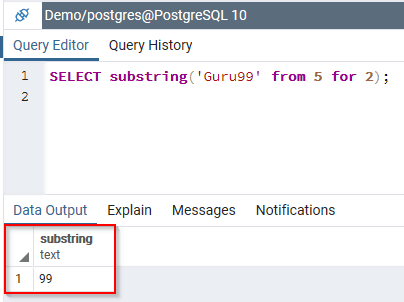

2) delimiter The delimiter is a string used as the delimiter for splitting. Functions getbyte and setbyte number the first byte of a binary string as byte 0. (Same as substring (bytes from start for count). The "replace" part of regexp_replace() replaces the entire string (because the pattern matches the entire string) with the first element matched (which is the part in parentheses). You need to use a negated character class in order not to 'overflow' to the next -separated parts: SELECT SUBSTRING (myField from 'HELLO: ( +)') AS test FROM myTable. Syntax The following illustrates the syntax of the PostgreSQL SPLITPART () function: SPLITPART (string, delimiter, position) Arguments The SPLITPART () function requires three arguments: 1) string is the string to be split. Extracts the substring of bytes starting at the start 'th byte, and extending for count bytes if that is specified. The part in the middle is identified as an element in the string. The pattern matches the entire string (it could be `'^. substr() returns the portion of the string from the specified start position (with the first character being counted from 1 ), optionally for the number of. You can even use the regexpmatch (string, pattern, flags), which returns a null if no match is found. This will return the values carabc and abcd. This is more handy than regexp_substr() because you don't have deal with the leading and trailing parens. You can use the statement as follows to see if a string contains a sub-string or not: select from strings where str 'abc'.
POSTGRESQL SELECT SUBSTRING HOW TO
The above can be confused by the presence of other parens in the comment - but it may be unclear how to handle that.Īnother method uses regexp_replace(): select regexp_replace(an.comment, '.*(.*).*', '\1') Because you want the first part after the '(', this is the second part of the string.

To match a pattern ignoring case, use ILIKE in place of LIKE. Split_part() splits the string based on a delimited. Try this: SELECT FROM events WHERE name LIKE 'Edward Sharpe and the Magnetic Zeroes' Or rather this: SELECT FROM events WHERE 'Edward Sharpe and the Magnetic Zeroes' LIKE '' name '' Also note that all string operations in Postgres are case sensitive by default. Assuming you have no other parentheses in the string: select split_part(replace(an.comment, ')', '('), '(', 2)įrom (values ('"Account Suspended - Labeler has tumbling names with (dca-5:anna williams,dca-6:Anna Williams)."'::text)) an(comment)


 0 kommentar(er)
0 kommentar(er)
